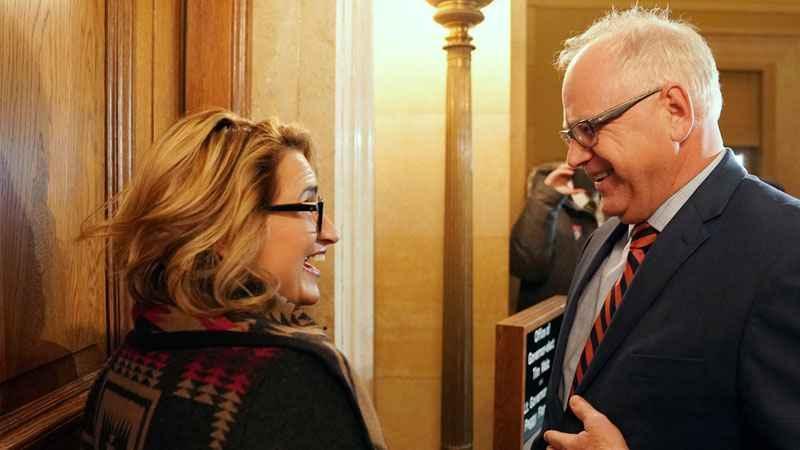Walz announces partnership between state, health care systems on race and ethnicity data collection

Lt. Gov. Peggy Flanagan and Gov.Tim Walz talk to each other at the state Capitol Thursday, Nov. 8, 2018, in St. Paul, Minn.[AP]
On Friday, Gov. Tim Walz and Lt. Gov. Peggy Flanagan’s Administration announced the publication of vaccination data by race and ethnicity made possible through a partnership between the state and the Minnesota Electronic Health Record (EHR) Consortium. This collaboration between public health and health systems is the first statewide effort of its kind in the country, according to Walz’s office.
The data – which will be published on the state’s COVID-19 vaccine dashboard – will inform additional, targeted strategies to ensure the equitable distribution of vaccine to Minnesotans of all races and ethnicities, including communities disproportionately impacted by COVID-19 as a result of systemic inequities.
“We are excited to announce this first-in-the-nation partnership to help us track vaccination data by race and ethnicity — a critical part of ensuring equity and fairness in our distribution,” Walz said in a statement. “Equitable access has been a cornerstone principle of our vaccination plans since the first doses arrived in Minnesota. This data-driven collaboration among members of Minnesota’s health care community will help us build upon and strengthen our equity efforts in every community across the state.”
The Minnesota Department of Health has been collaborating with the EHR Consortium throughout the pandemic to identify and address disparities in COVID-19 testing. The collaboration expanded into vaccination disparities analysis once vaccines began arriving in Minnesota, according to the governor’s office.
Through weeks of planning, the groups have established a process to generate high-quality, reliable data that will inform vaccination strategies for all partners.
“This important, intentional work to inform the equitable distribution of health care resources for Minnesotans is a true collaboration,” said Tyler Winkelman, MD, MSc at Hennepin Healthcare who is leading the MN EHR Consortium COVID-19 Vaccine Project. “The ongoing partnership will not only guide decision-making processes related to COVID-19 vaccination distribution, but also provides the infrastructure needed for future public health crises.”
The data is generated when participating health systems produce a summary report for their patients who have received a vaccine as reported to the Minnesota Immunization Information Connection (MIIC). Summary data contributors include Allina Health, CentraCare, Children’s Hospitals and Clinics of Minnesota, Essentia Health, M Health Fairview, University of Minnesota, HealthPartners, Hennepin Healthcare, Mayo Clinic and Mayo Clinic Health System, and North Memorial Health.
The Consortium is also working with Sanford Health and the Minneapolis VA Health Care System to add summary data from their organizations in the coming weeks and will look to add additional clinics and systems contributing summary data in the future, according to a release. Summary data also includes vaccines delivered by community vaccine sites, pharmacies, retailers and private clinics in the state.
Race and ethnicity data will be published and updated weekly on the state’s COVID-19 vaccine dashboard.
Data reported by the Consortium does not represent information for all vaccinations and faces a number of limitations, such as unmatched patient profiles and patients with no existing data or race or ethnicity information. Those who receive the vaccine must have received care from one of the participating health systems in the last five to 10 years in order to have information included in this summary data.
In addition to the EHR partnership, Minnesota is using the COVID-19 Vaccine Connector to gather detailed demographic data to inform ongoing equitable vaccine strategies.
“Each of these data sources alone hold a lot of information about COVID-19 vaccination status and patient demographics, but they work better together,” said MDH Commissioner Jan Malcolm. “The power of this collaboration is we are able to have a clearer view of who is getting vaccinated in Minnesota and work together to close equity gaps.”
“So many Minnesotans – especially our Black, Latino, Asian Pacific Islander, and Native communities – face unique barriers to vaccine access and have been disproportionately impacted by this virus, and the data released today highlights these challenges," Walz said.